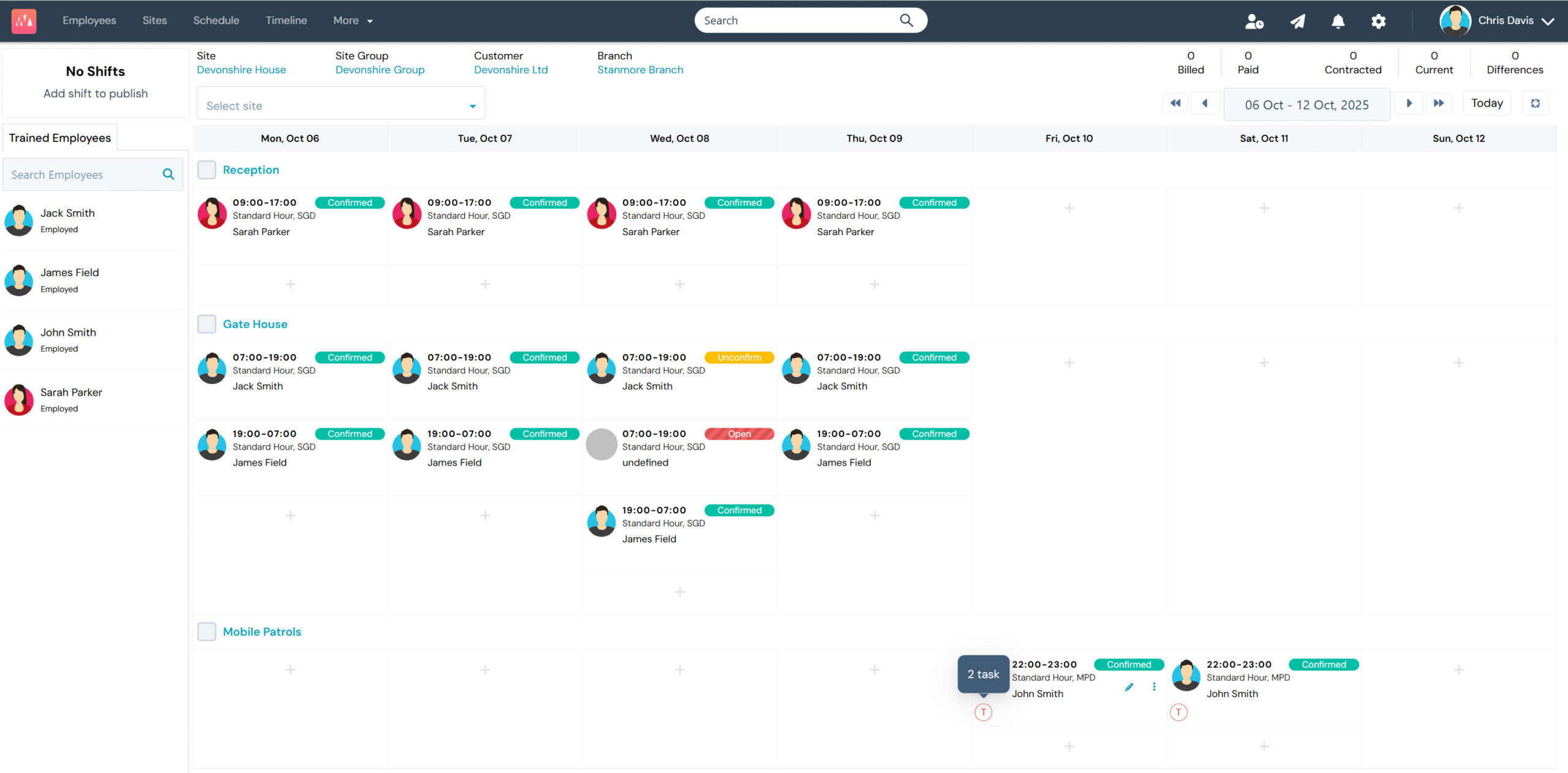Key Takeaways:
- Cybersecurity: 43% of UK businesses reported cyber breaches in the past year.
- Insider Threats: 60% of organisations experienced insider threats.
- Physical Security: Retail thefts cost UK retailers £2.2 billion annually.
- Supply Chain Risks: Outdated systems pose significant vulnerabilities.
- Regulatory Compliance: Non-compliance can result in fines up to £100,000 per day.
- Public Safety: New legislation mandates enhanced security measures for large venues.
- Technological Risks: AI and IoT integrations introduce new security challenges.
Introduction:
Running a business in the UK in 2025 isn’t just about profits and growth; it’s also about keeping your assets, staff, and data safe. From bustling London offices to Leicester warehouses and Manchester tech hubs, businesses face a growing mix of threats.
Take cybercrime, for instance: according to the Cyber Security Breaches Survey 2025, 43% of UK businesses reported experiencing a cyber attack or breach in the past year.
That figure jumps to 70% for medium-sized firms. Physical security isn’t any safer; retailers alone face over 55,000 thefts daily, costing £2.2 billion annually. And insider risks? Around 60% of UK organisations report incidents involving staff misuse of access.
With threats like these, relying on outdated security measures is like leaving your front door wide open with a sign saying, “Come on in!” In this article, we’ll break down the biggest corporate security risks in the UK and how businesses can tackle them head-on.
1. Cybersecurity Threats: A Growing Concern
Cyberattacks have become a significant threat to UK businesses. According to the Cyber Security Breaches Survey 2025, approximately 43% of UK businesses reported experiencing a cyber breach or attack in the past year.
This figure rises to 70% for medium-sized firms and 74% for large enterprises. Ransomware attacks, which involve encrypting a company's data and demanding payment for its release, have seen a surge. In 2023, the UK experienced a 70% increase in ransomware attacks compared to the previous year, with small and medium-sized enterprises (SMEs) being particularly vulnerable.
Phishing remains the most prevalent form of cybercrime, accounting for 93% of incidents reported by businesses and 95% by charities.
2. Insider Threats: Risks from Within
Insider threats pose significant risks to organisations. A study found that 60% of organisations reported experiencing an insider threat in the last year. These incidents often involve employees misusing access privileges, leading to data breaches or operational disruptions.
The rise of "bossware" technology, used by employers to monitor employees' activities, has also raised concerns. While intended to prevent insider threats, such surveillance can erode trust and impact employee morale.
3. Physical Security Breaches
When it comes to corporate security in the UK, physical protection is just as important as cyber defence. Take retail, for example: the British Retail Consortium reports that UK shops experience over 55,000 thefts every single day, with shoplifting alone costing a staggering £2.2 billion annually. That’s enough to make any business owner’s hair stand on end!
It’s not just stores that are at risk. Business property robberies hit a record 12,000 incidents last year, averaging 33 per day, a shocking 52% increase from the previous year. Warehouses, offices, and even small commercial premises are all targets.
The lesson? Outdated locks, unmonitored entrances, and minimal surveillance just won’t cut it anymore. Investing in modern physical security solutions, such as CCTV, access control, and mobile patrols, can help UK businesses stay one step ahead of thieves and vandals, protecting assets, staff, and peace of mind.
4. Supply Chain Vulnerabilities
Supply chain attacks have become more prevalent, with cybercriminals targeting third-party vendors to gain access to larger organisations. The National Cyber Security Centre has highlighted the importance of securing supply chains to mitigate these risks.
Outdated software and unsupported systems within the supply chain can serve as entry points for cyberattacks. The Royal Institution of Chartered Surveyors warned that outdated systems, such as buildings still running unsupported software like Windows 7, pose considerable vulnerabilities.
5. Regulatory and Compliance Risks
Non-compliance with data protection regulations can lead to significant penalties. The UK's Cyber Security and Resilience Bill, introduced in 2024, proposes fines of up to £100,000 per day for organisations failing to act against relevant cyber threats.
The General Data Protection Regulation (GDPR) continues to enforce strict guidelines on data handling, with organisations facing substantial fines for breaches.
6. Terrorism and Public Safety Threats
In 2025, UK businesses and event organisers have to take security more seriously than ever, thanks to the Terrorism (Protection of Premises) Act 2025. This legislation requires venues hosting large events, such as stadiums, concert halls, and exhibition centres, to implement measures that minimise the risk of terrorist attacks.
And it’s not just bureaucracy for the sake of it: the UK Home Office reports that venues with inadequate security were 42% more likely to experience threats or attempted breaches in the past two years.
Proactive measures can include controlled access points, trained security personnel, CCTV monitoring, and emergency evacuation plans. It’s about being ready before anything happens, rather than reacting after the fact.
For UK businesses, this is a wake-up call: investing in robust security protocols isn’t optional; it’s essential for protecting staff, visitors, and your reputation. After all, staying one step ahead can make all the difference when it comes to public safety.
7. Emerging Technological Risks
Technology is fantastic until it isn’t. In 2025, UK businesses are embracing artificial intelligence (AI) and the Internet of Things (IoT) to streamline operations, improve efficiency, and wow customers. Smart sensors, connected devices, and AI-driven analytics are transforming everything from warehouses in Birmingham to London offices. But here’s the catch: every connected device is a potential doorway for cybercriminals.
AI-driven attacks are on the rise, using intelligent algorithms to breach systems faster than ever. Meanwhile, IoT devices like smart locks, sensors, or networked printers can be hijacked to access critical business data. According to recent UK reports, over 60% of IoT-enabled businesses have experienced security incidents in the past year.
This means businesses can’t just rely on traditional security measures. Protecting modern operations requires advanced strategies, including AI-powered monitoring, network segmentation, and continuous vulnerability assessments. In short, technology opens doors for growth and occasionally, the wrong people, too!
Conclusion
In 2025, UK businesses can’t afford to be complacent about security, whether you’re running a bustling London office, a warehouse in Manchester, or a retail chain in Leicester. The threats are everywhere: 43% of UK businesses faced a cyber breach last year, retail thefts cost £2.2 billion annually, and insider incidents hit around 60% of organisations. That’s not small change!
The key to staying safe is a comprehensive approach: protect your digital assets, strengthen physical security, and ensure compliance with regulations like GDPR and the Terrorism (Protection of Premises) Act 2025. But here’s the thing, it can be done without losing your head over spreadsheets or manual checks.
That’s where Intraguard comes in. Their tailored security solutions combine modern tech, real-time monitoring, and expert guidance, helping UK businesses safeguard assets, staff, and reputation. Don’t wait for the worst to happen; upgrade your security today and stay one step ahead of the game.
Frequently Asked Questions
What Are The Biggest Security Risks for UK Businesses in 2025?
Businesses face a mix of threats, including cyberattacks (43% of UK firms reported breaches last year), insider risks (60% of organisations), physical theft, and supply chain vulnerabilities.
How Can a Business Protect Against Cyber Threats?
Implement strong firewalls, regular software updates, employee training, and intrusion detection systems. Combining digital security with expert monitoring from companies like Intraguard significantly reduces risk.
Do Security Threats Really Target Small UK Businesses?
Absolutely. SMEs are often easier targets than large corporations. Theft, ransomware, and data breaches affect businesses of all sizes across the UK.
How Can Physical Security Be Improved?
Using CCTV, access control systems, smart locks, and regular security patrols, combined with workforce management solutions, helps ensure assets and staff are protected.
Why Choose Intraguard For Corporate Security?
Intraguard provides tailored solutions for UK businesses, integrating physical, digital, and regulatory security measures with real-time monitoring and expert guidance to mitigate risks effectively.














